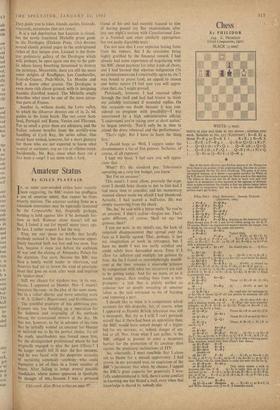Amateur Status
By GILES PLAYFAIR
IF, as some sour-minded critics have recently been suggesting, the BBC makes too profligate a use of amateur talent, that cannot be from miserly motives. The amateur seeking fame as a television entertainer may be especially favoured by the Corporatidn, but, illogically perhaps, nothing is held against him if he demands for- tune as well. Rumour alone doesn't tell me that. I found it out for myself many years ago. In fact, I rather suspect I led the way.
True, my star shone so briefly that hardly anybody noticed it, but that was because oppor- tunity knocked both too late and too soon. Too late, because it came just before the outbreak of war and the closing of Alexandra Palace for the duration. Too soon, because the BBC was then a lonely world leader in television, and America had yet to invent the kind of entertain- ment that goes on week after week and requires an 'anchor-man.'
Still, my chance for stardom was, in its way, classic. I appeared as Hamlet. Not—I mustn't overstate the case—in the play of the same name, but in a rather shorter and more amusing work --W. S. Gilbert's Rosencrantz and Guildenstern.
The youthful producer of this ambitious pro- aramme was fast building up a reputation for the boldness and originality of his methods among the eyestrained viewers of the day. He Was not, however, so far in advance of his time that he actually wanted an amateur for Hamlet or believed me to be the perfect choice. To tell the truth, unorthodoxy was forced upon him, for the distinguished professional whom he had originally engaged to play the part (Olivier? I no longer recall) fell ill near the last moment, and he was faced with the desperate necessity of recruiting somebody— anybody—who could Memorise a lot of lines in a fewer number of hours. After failing to tempt several possible Candidates, whose names appeared in Spotlight, he thought of mea because I was a personal
This week Alan Brien writes on page 97.
friend of his and had recently boasted to him of having passed my Bar examinations after just one night's session with Constitutional Law in .a Nutshell and other similarly appropriate but not easily digestible texts.
I'm not sure that I ever expected lasting fame from the venture, But I do remember being highly gratified by the financial reward. 1 had already had some experience of negotiating with the BBC about payment for other kinds of chore, and I had learned that whereas indignation ('in no circurnstances'can I conceivably agree to, etc.') was bound to prove fatal, an appeal to reason and better nature ('1 feel sure you will appre- ciate that, etc.') might prevail.
Previously, however, I had received offers through the mail and had had leisure to think out suitably restrained if wounded replies. On this occasion—no doubt because it was con- sidered so pregnant with possibility—I was interviewed by a high administrative official.
'I understand you're taking over at short notice,' he began severely. 'You'll only be in time to attend the dress rehearsal and the performance.'
'That's right. But I have to learn the thing first.'
'I should hope so. Well, I suggest under the circumstances a fee of live guineas. Inclusive, of course, of all expenses.'
I kept my head. 'I feel sure you will appre- ciate that . .
'What? It's the standard pay. Television's operating on a very low budget, you know.'
'But I'm an amateur.'
This wasn't, I must allow, precisely the argu- ment I should have chosen to put to him had 1 had more time to consider, and his momentary stunned silence made me afraid I had blundered. Actually, I had scored a bull's-eye. He was simply recovering from the shock.
'Ho, ho,' he said with a brave smile. `So you're an amateur. I didn't realise—forgive me. That's quite different, of course. Shall we say ten guineas, then?'
I can see now, in my mind's eye, the look of surpris&I disappointment that spread over his face as I hastily agreed. That, perhaps, is just my imagination at work in retrospect, but I have no doubt I was too easily satisfied and could safely have demanded more. Even if I allow for inflation and multiply ten guineas by four, the fee I found so overwhelmingly munifi- cent at the time remains a miserable pittance by comparison with what my successors are said to be getting today. And for no more, or so it would appear, than reading lines from a tele- prompter: a task that is plainly neither so arduous nor so deeply revealing of amateur talent as the task entrusted to me of learning and repeating a part.
I should like to think it is competition which accounts for this disparity, for, of course, when I appeared as Hamlet British television was still a monopoly. But, try as I will, I can't persuade myself that if then, had been an opposition then, the BBC would have sensed danger of a higher bid for my services, or, indeed, danger of any bid at all. Nor, from what I can gather, is the BBC obliged at present to erect a monetary barrier for the protection of its amateur stars against the predatory inclinations of ITV.
So, reluctantly, I must conclude that Lalone am to blame for a missed opportunity. I had grown, in my paranoid way, so suspicious of the BBC's parsimony that when, by chance, I tapped the BBC's great capacity for generosity I woe- fully underestimated it. Still, there's some comfort in knowing one has blazed a trail, even when that knowledge is shared by nobody else.






































 Previous page
Previous page